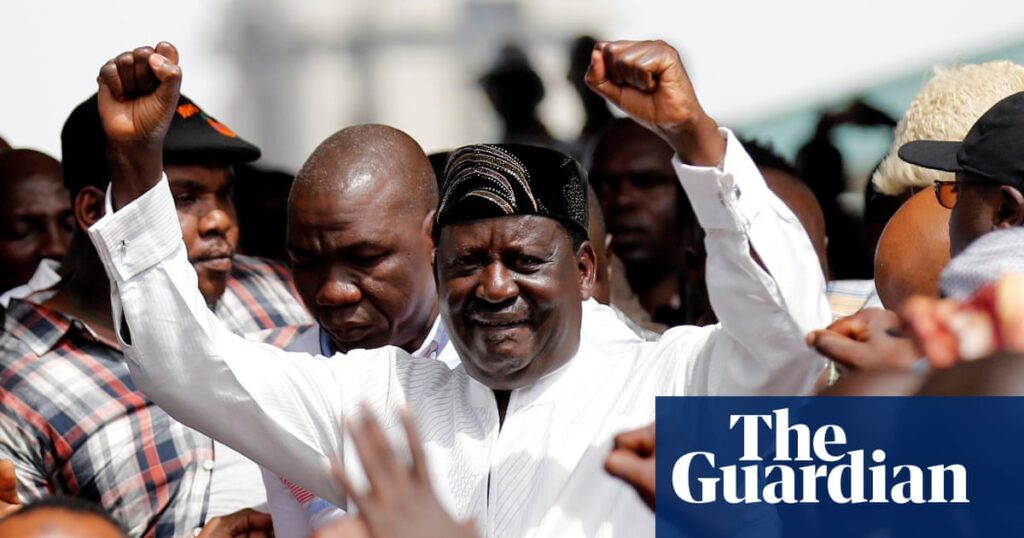Raila Odinga, who has died aged 80, was the prime minister of Kenya from 2008 until 2013 and a longtime leading member of his country’s opposition.
A man who was both divisive and revered, he came from an aristocratic political lineage. His father, Oginga Odinga, had been a leading figure in the movement for independence from Britain in 1963 and served as vice-president to the country’s first president, Jomo Kenyatta, who begat his own lineage. It was Kenyatta’s son, Uhuru, who defeated Raila Odinga in the 2017 presidential elections.
Odinga contested the presidency five times – 1997, 2007, 2013, 2017, 2022 – losing each time and citing fraud on each occasion. The best known of these occasions was in 2007 when he was defeated by Mwai Kibaki. Both candidates, however, had prepared for loss or challenge against victory by forming militias that were unleashed after the result was announced. This marked the most violent episode in Kenya’s independent political history.
There were grounds for expecting at least a close race. Polling by US groups had suggested an Odinga victory. But the violence reached such intensity that the African Union dispatched the former UN secretary-general Kofi Annan to act as mediator. Annan moved with speed, asking all other would-be mediators to leave, and promising indictments before the international criminal court for all those who continued to encourage violence.
Annan also instituted a procedure that was later copied by Thabo Mbeki in the equally controversial 2008 Zimbabwe elections – the insertion of the defeated presidential candidate into the role of prime minister. In Zimbabwe that was Morgan Tsvangirai and in Kenya Raila Odinga – even though both men had some, even if disputed, claim to the presidency. Both accepted the prime ministership and Odinga came to work ostensibly closely with Kibaki.
If violence in 2007 was a conspicuous demerit to both men, Odinga’s acceptance of a secondary position was seen as a mark of grace and a desire to spare the Kenyan people from further chaos. The unrest was not repeated, even though Odinga lost subsequent presidential elections. For Annan, and later for Mbeki, it seemed the principle of inclusivity was greater than the principle of honest and open democratic choice. If, as had been remarked, politics in Kenya was about whose turn it was to eat, the outcome in 2007 was a place at the table for all.
This had some resonance in the country. Odinga was a member of the Luo ethnic group. Kibaki was from the Kikuyu group – long politically dominant. Fierce rivalry existed between the two factions. To achieve at least a degree of top-table membership for both was a real breakthrough.
Odinga was born in Maseno, Kisumu District, the son of Mary Juma and Oginda Odinga. He was educated at Maranda high school, from where his father despatched him in the 1960s to East Germany to study at the Herder Institute, part of the University of Leipzig. But the young Odinga was not a talented academic student and was more adept at vocational subjects, achieving a certificate in welding.
Always religious, he became a born-again Christian and was fiercely opposed to homosexuality. But he was also an admirer of progressive forces and rebels elsewhere. In 1973 Odinga married Ida Anyango Ayoo. Of their four children, one son was named after Fidel Castro and a daughter after Winnie Mandela.
Odinga was arrested several times in the 80s and early 90s when the country was under one-party rule. Multiparty politics from 1992 gave him his chance to participate in the country’s affairs without fear of detention.
After his period in office as prime minister came to an end, Odinga travelled the world giving lectures on democracy, but without ever seeking seriously to undermine those who had defeated him. From 2018 to 2023 he served in a senior position, high representative for infrastructure development, in the African Union.
After the fractious presidential elections in 2017, Odinga and Kenyatta ceremonially shook hands in what came to be seen as a symbolic moment dubbed the beginning of “building bridges”.
Odinga left behind a 1,040-page autobiography, but the assessment of his life and career await the perspective of time. Certainly it should be said that the politics of Kenya by the time of his death had become far calmer and more measured than when he first entered the political realm, and in this he played a part.
Odinga is survived by his wife and three of their children, Rosemary, Raila and Winnie. His son Fidel predeceased him.

